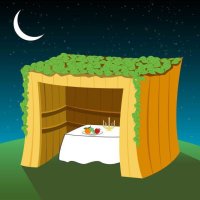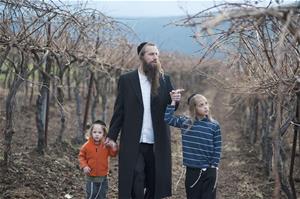click to dowload our latest edition
CLICK HERE TO SUBSCRIBE TO OUR NEWSLETTER


Published
8 years agoon
By
adminMAAYAN JAFFE-HOFFMAN
Avichai Koch says farming is in his blood. The son of Holocaust survivors, his parents came from Europe to an Israeli moshav near Tel Aviv where they worked the land, grew olives, herded cattle and sold chickens until their recent retirement.
Israeli farmer Ira Zimerman with his children in his vineyard which harvests grapes to serve a large area winery.
PHOTOGRAPH: THE SHMITAH FUND

Today, the family tradition lives on at Koch Farm, located on Moshav Tekuma, 6,5 km from the Gaza Strip. There, Koch erected a series of handmade greenhouses, where he grows everything from cherry tomatoes, cucumbers, eggplant, radishes and scallions to herbs and mangos.
At this time of year, Succot (known as Chag Ha-Asif or the Festival of Ingathering), Koch is reminded just how tied his profession is to Jewish law and tradition.
“In Israel, farming is definitely Jewish,” Koch told JNS.org. “Everything is tied to the Jewish calendar. Around Rosh Hashanah is pomegranate season and every Succot the etrogim [the yellow citron fruit] are ready. The seasons of the year are the seasons of the Torah. When I plant, I don’t say ‘by August’, I base my growing seasons on the holidays.”
Farmers such as Koch, however, are becoming fewer and far between in the Holy Land. Internal economic challenges, reduced government investment in the agriculture industry, and external challenges such as the Boycott, Divestment and Sanctions (BDS) movement have, in the last decade, forced many family farmers to shut down or sell to larger farming corporations.
“You see many empty greenhouses in the Negev,” Koch said, “their plastic coverings flying in the wind.”
A report released last month by the Israel Farmers Association found Israeli agricultural exports in deep crisis with revenue numbers remaining stagnant over the last five years. Last year, agricultural revenue was lower than in 2014, at $7,72 billion.
In 2015, the crop sectors lost about $265 million in revenue. The amount of vegetables sold dropped about six per cent, while prices rose around seven per cent. In the same year, the Central Bureau of Statistics reported that household spending on agricultural products makes up just seven per cent of overall household expenditures.
Taking a historical look back, in 1949, a year after the founding of the Jewish state, agriculture accounted for 12 per cent of gross domestic product (GDP) and 65 per cent of exports, according to the Central Bureau of Statistics. By comparison, in 2011, agriculture accounted for just 1,7 per cent of GDP and two per cent of exports.
Analysts say the challenges to the agricultural industry are, in part, due to a lack of investment by the government, which recently shifted from providing direct to indirect assistance.
Further, while Israel is the “start-up” nation, it has invested much more heavily in advanced cyber, communication and bio-technologies than in water, solar energy or seed technology, leaving many farmers behind the times.
As farmers age – Koch says most farmers are in their 60s or older, like his father – their children are opting for other careers because “the business is very difficult”. Of his siblings, he is the only farmer.
Today, there are about 5 700 active farmers in Israel. That number was closer to 20 000 in the ‘80s, according to Dave Matkowsky, founder of The Shmitah Fund that provides financial assistance to Israeli farmers who observe a sabbatical year every seventh year, as mandated by the Torah.
One of the main obstacles has been BDS which has plagued many local farmers, Koch said. From about 2005 until 2013, Koch exported large pallets of food to European supermarkets. Then, stores started paying less for Koch’s produce, which they reported difficulty in selling.
“We have to label our products as grown in Israel,” explained Koch. “One of the supermarkets told me that customers would see those labels and throw the products on the ground, making a big mess. Finally, the owners told me, ‘I cannot deal with this situation’.”
Matkowsky worries a diminishing agricultural sector could put Israel in a situation of food insecurity. With BDS and Israel being in “a dangerous neighbourhood”, he said Israel’s imports could be threatened.
“We want to make sure we can produce enough internally so nutrition doesn’t become an issue,” he said.
Farmer Ira Zimerman runs a grape vineyard near Meron in northern Israel, harvesting 7,4 acres of grapes to serve a large area winery. He awakes daily before 05:30, prays and then tends to the fields until at least 16:00. If he has any energy left, he studies Torah.
The father of six young children, Zimerman said his kids spend their free time with him in the field.
“A guy who works as a farmer does not do it for the money. Farming is for the soul,” said Zimerman, who connects his work to his faith in G-d.
“The rain, wind, sun, temperature, humidity – there are so many things out of your control that you see the miracles,” he said. “For 2 000 years, the Jewish people wanted to be in Israel. Today, we have the benefit of coming back here. Now, we can take the land and do what G-d asked us to do with it, farm. I feel I am doing this for all of Am Yisrael (the nation of Israel).” (JNS.org)
